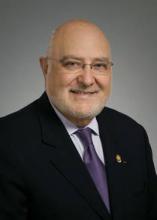Throughout the last year, Fellows of the American College of Surgeons (ACS) had many opportunities to reflect on our rich history as an organization and as a profession. Having assumed office at the conclusion of the College’s Centennial celebration, I felt that it was appropriate to shift the focus from our past to the future. The future promises to deliver innovation and advances in science. and I think it is important that, before we adopt them. we check them against our values. Thus, I have chosen as the theme of my presidential year "The Surgeon of the Future: Anchoring Innovation and Science with Moral Values.”
Several forces are shaping the future of surgery. First, the introduction and adoption of new ideas, techniques, and devices have resulted in monumental progress in surgery. For many years, the pace of innovation included intervals of time to test and validate new ideas and, when useful, to design educational and training methods to ensure their safe implementation. The pace of change has increased substantially, however, and will likely accelerate in the future.
The College is constantly scanning the horizon for new ideas and developing appropriate programs to train Fellows in the safe adoption of new devices and techniques. I encourage Fellows to take advantage of these opportunities as innovation is causing the boundaries between the specialties to blur. When I started practice, there was a clear delineation between what I did as a surgeon—primarily open operations—and what most medical specialists did—primarily diagnostic and noninvasive therapy. However, because of advances in medical technology and techniques, many services that only a surgeon once could provide are now delivered by non-surgical medical specialists. To maintain active practices in the future, surgeons will need to be skilled in all diagnostic and therapeutic aspects of disease, including interventions done via open, endoscopic, percutaneous, or natural orifice approaches
Another force affecting surgery is society’s increased concern with health care quality and costs. Value in health care is often defined as the ratio between outcomes and costs. I urge surgeons to focus on outcomes, in particular outcomes of relevance to patients and employers, including the relief of pain, ability to return to work quickly, and other quality of life issues. This is the “new” accountability of our craft: accountability for quality, for safety, for costs, and for outcomes.
Value-based care cannot be rendered by individuals acting alone; it requires high-performance teams. These teams need leadership that fosters exceptional communication, mutual respect and support, and the development of best practices.
As we face all these forces impacting our practices let us not forget that each of us has the opportunity to shape the future. True, external influences are at play, but our direct involvement will help to modulate those forces. The pessimists will tell you that the sky is falling, and there is nothing you can do about it. Don’t believe them. The future is not predetermined. You may not be able to achieve everything you want, but you should set for yourselves the highest goals and travel in that direction for as far and as long as you can. Next time you see something that needs fixing, get involved, then exercise your leadership and illuminate a path toward a better future.
The College has developed the infrastructure to help surgeons effect change. Whether it is through the Division of Education filling the gap between your practice and the current state of knowledge; or through the Division of Research and Optimal Patient Care with its measurements of quality, safety, and costs; or through the Division of Advocacy and Health Policy’s efforts to help modulate the implementation of sound socioeconomic policies; or through the Division of Member Services with its focus on you, your chapters, your projects, the College provides surgeons with the right platform to exercise their leadership. I encourage you to get involved in these programs, not only because it will help you in your career, but because it is the right thing to do for our patients and our society.
Thus far we have discussed how innovation and new knowledge will change practices and how can the surgeon of the future can remain relevant through the ACS platform. As you travel this rather difficult path of constant change, adaptation and re-invention, you will need a moral compass to guide your actions and distinguish right from wrong. This is the “anchor” I refer to in my theme for this year--the one provided by moral values. The ACS staff led by example last year when they identified a set of values that now guides their work. I have examined these principles and find that they speak for me as a surgeon as well.

